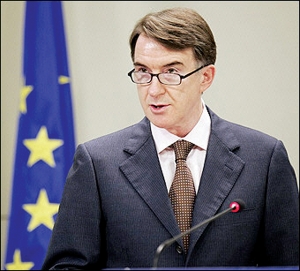|
By David Cronin
Robert Clive epitomised the excesses of the British Empire. A master, in his own words, of “tricks, chicanery, politics and the Lord knows what”, the head of the East India Company did not hesitate to use mass starvation as a means of asserting control.
As well as plundering the Bengali treasury of its silver and gold reserves (transported out of India on over 100 boats), his firm pushed food prices to levels that the poor could not afford. One third of Bengal’s population was wiped out in the famine that began in 1769; as their corpses rotted, wily British entrepreneurs hoarded the grain that would have saved their lives.
 Sharing many of Clive’s personality traits, Peter Mandelson set out to reaffirm the influence of major corporations in India almost 250 years later. In his then role as a European Union commissioner, Mandelson was pictured smiling radiantly when he visited New Delhi in 2007 to launch talks aimed at reaching a “free trade agreement”. That 150,000 Indian farmers had committed suicide (according to the Delhi government’s own data) over the preceding decade because they found themselves unable to compete with the predatory tactics of western food companies did not seem to trouble him. Nor did he express any concern about how the suicides were a direct result of what happens when the objective of “free trade” is pursued with a quasi-religious zeal. Sharing many of Clive’s personality traits, Peter Mandelson set out to reaffirm the influence of major corporations in India almost 250 years later. In his then role as a European Union commissioner, Mandelson was pictured smiling radiantly when he visited New Delhi in 2007 to launch talks aimed at reaching a “free trade agreement”. That 150,000 Indian farmers had committed suicide (according to the Delhi government’s own data) over the preceding decade because they found themselves unable to compete with the predatory tactics of western food companies did not seem to trouble him. Nor did he express any concern about how the suicides were a direct result of what happens when the objective of “free trade” is pursued with a quasi-religious zeal.
The official narrative that the EU is seeking an “agreement” with India must be treated with circumspection. A genuine agreement implies that both sides enjoy some level of equality. Yet despite the impressive macroeconomic performance of India in recent years, nobody can seriously claim that it is on the cusp of European-style prosperity. Belgium, one of the EU’s smaller countries with 10 million inhabitants, commands a larger share of world trade than India, despite the latter’s population exceeding one billion.
To negotiate an “agreement” in good faith, both sides also have to be able to set the agenda for the talks, the latest round of which are taking place this week. Most information that has become publicly available, however, indicates that the principal texts on the table have been prepared by the EU side. Using sneaky tactics, the EU is trying to persuade India to make concessions that go way beyond those already made as part of its membership of the World Trade Organisation.
For example, the EU has recommended that new rules on intellectual property should be introduced in India. These would require that formulae used to develop new medicines could not be used by makers of non-branded drugs in India for a period of several years. The consequences of this measure would by no means be limited to the Indian subcontinent. As the magazine Business Standard recently pointed out, India’s status as a top manufacturer of generic medicines makes it the “dispensary for the poor of the world”. The EU’s quest to have these medicines subject to rigorous patenting procedures would inevitably push up their prices. Millions of lives could be lost as essential treatments for AIDS and other major killers become too costly at the behest of pharmaceutical companies like Pfizer and GlaxoSmithKline.
It is hard to be optimistic when confronted by the stark reality of how Brussels bureaucrats heap scorn on everything other than the protection of corporate profits. Nonetheless, a small level of democratic oversight has finally been brought into the secretive world of EU trade negotiations.
Despite its many flaws, one positive aspect of the EU’s Lisbon Treaty is that it gives members of the European Parliament more powers to scrutinise trade agreements (including the power to block their entry into force). Whether or not MEPs use these powers responsibly will almost certainly depend on what their voters tell them to do.
There is a huge onus, then, on all of us who are angry at the corporate dominance of European politics to keep harrying our elected representatives until they put trade at the service of the poor. Only then will the appalling legacy of Robert Clive be buried.
|

